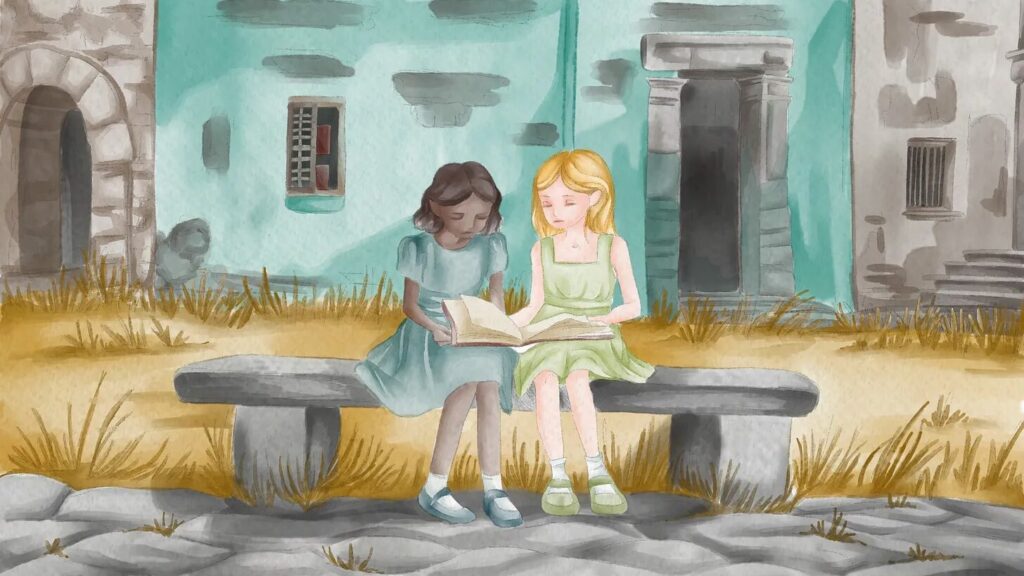What My Brilliant Friend Teaches Us About the Freedom to Choose Who We Are
I finished reading Elena Ferrante’s My Brilliant Friend series some time ago, yet it lingers. There’s something in that story that resonates before you even know how to explain it. A familiar weight, as if you’ve always known the neighborhood, its unspoken rules, its invisible chains.
My Brilliant Friend is, at its heart, a profound reflection on what shapes us: bonds, silences, expectations. It’s about women. About men. About relationships. Poverty. Territory. Politics. Violence. And it’s deeply about work—work that is absent, precarious, oppressive, or redemptive. Work as the fragile engine of a future that may—or may not—take shape.

Brilliance Alone Doesn’t Make You Free
Across four volumes, we follow the lives of Raffaella “Lila” Cerullo and Elena “Lenù” Greco, from childhood in 1950s Naples through adulthood. The neighborhood—a poor quarter on the city’s edge—is what binds them: a place where their genius sparks, but also the cage that traps them.
Their paths diverge. Lila is sharp, rebellious, incandescent. But every opportunity crashes against walls she didn’t build: family, poverty, a violent husband. Every possibility comes at a cost—and rarely is she allowed to decide whether it’s worth paying.
Her intelligence is treated as a dangerous exception. Men praise her when she seems “not like the others” and fear her when she disturbs the fragile balance. Lila’s brilliance unsettles; her being “too much”—too clever, too fierce, too aware—marks her as abnormal, isolating her, turning her into something to be explained away. At times she’s admired for being “different from other women.” At others, she’s scorned for the very same reason.
It’s a dynamic that still echoes today. A brilliant woman is often framed as an anomaly—“one of the guys,” “a woman with guts.” Intelligence, drive, ambition are still too often read through a gendered lens: not simple human qualities, but “masculine” traits in a woman.
Lenù, on the other hand, studies. She escapes Naples, writes, enters another world. But her path requires perfection at every step—only the best grades, the most polished results—just to earn the right to try. Even then, her freedom is conditional. Her success as an intellectual and writer never frees her entirely. She must not “overdo it.” She must not neglect her children. She must not disappoint expectations. And even when she achieves, guilt remains—the guilt of ambition, of claiming space for herself.
We’ve all felt a little like Lila: brilliant, instinctive, passionate, but out of place. And a little like Lenù: insecure, seeking approval, believing that if we only played by the rules, we’d earn what we were promised.
The real question isn’t who are they? what do they do? but: how much freedom do they—do we—truly have to be and do those things?

Today’s Numbers: The Neighborhood Was Never Just a Place
Ferrante shows us that work can be emancipatory—but only if it’s accessible, only if it doesn’t demand sacrifices imposed from above. And the data tells us: freedom of choice in work is still far from equal in Italy.
- Employment rate: 52.5% for women vs. 72.6% for men (ISTAT, 2025).
- Pay gap: Women earn 10.7% less on average, and up to 27.3% less in executive roles (Rome Business School, 2025).
- Part-time contracts: 1 in 3 women works part-time, mainly due to caregiving duties (ISTAT, 2025).
- Motherhood penalty: 1 in 5 women leaves work permanently after having children (Save the Children, 2024).
- Unpaid care: Women spend almost double the time men do (ISTAT, 2025).
- Entrepreneurship: Only 28.8% of businesses are women-led (ISTAT, 2025).
- Leadership: Just 3% of CEOs in Italy are women, compared to 7% in Europe and 8% globally. Women hold only 28% of all managerial roles (Rome Business School, 2025).
When a woman does reach a position of power, the celebration often feels grotesque—paraded as proof of progress, when in fact it underlines how exceptional she still is. If equality must be celebrated, is it really equality? Or just theater?
And progress is recent. Until 1963, women couldn’t become judges in Italy. Until 1975, they couldn’t open a bank account without their husband’s permission. Women entered the State Police only in 1981. Only in 2006 did it become illegal to ask a woman if she planned to have children in a job interview. Only in 2010 were gender-based workplace discriminations formally outlawed.
Today, in 2025, we’re still far from parity. Inequality is stitched into our culture, our models, our gestures. The true milestone will come not when we celebrate every victory, but when victories stop needing celebration at all.
And Men? They’re in the Neighborhood Too
Conversations on gender equality often slip into a binary trap: women vs. men. But My Brilliant Friend suggests something deeper. Around Lila and Lenù are men who, at first glance, appear free—working, commanding, deciding. And yet they too are imprisoned.
In the neighborhood, men must be strong. They must provide. They must dominate. They must perform a precise model of masculinity—even when they lack the tools to live up to it.
There’s Alfonso, who can express himself only by inhabiting Lila’s image, and pays for it with stigma. Rino, Lila’s brother, who first admires her brilliance but, when he realizes he cannot manage without her, collapses into anger and self-destruction—his failure framed as a failure of manhood itself. And Pietro, Lenù’s husband: cultured, well-meaning, yet unable to imagine sharing household burdens. Supporting her career, in his mind, means not obstructing it—while quietly leaving her to carry everything else.
Their freedom, too, is stifled. They are trapped by fear of judgment, by the demand to uphold an ideal of masculinity that leaves no room for fragility or nuance. Their cage is less visible, but just as real—leading to silence, power games, control, violence.
The novel reminds us: the issue is not only “who has more freedom.” It’s whether anyone truly has the freedom to choose who they are.

Work Shouldn’t Define Us—But It Must Be a Right
If Lila had been born elsewhere, in a place that trusted her, who might she have become? An engineer? A writer? A designer? Maybe. Maybe not. But she would have had the chance to try.
And that’s the point. Work doesn’t have to define us. For some, it does. For others, it doesn’t. But everyone deserves the right to decide how much space work takes up in their life—without justifying it, without sacrificing other parts of themselves, without gender predetermining what is “appropriate” to want.
Equality means building contexts where difference doesn’t turn into disadvantage. Where women aren’t treated as exceptions, risks, or problems. Where men can shed an exhausting model of hyper-performance.
Equality is possibility.
I think of the women I know: friends, colleagues, strangers. Some have always worked. Some fight every day to. Some feel fulfilled. Some wonder if they’re doing enough. Some wonder if it’s worth it.
What they all seem to seek, in different forms, is something simple yet radical: the chance to choose. To try. To not be locked into destiny. To not be forced to match an image of what they “should” be.
Because equality is not a gift. It’s not a prize to be earned. It’s a shared horizon. An open space where existing, becoming, and realizing oneself is not a battle—but a right.
And as long as even one person—woman, man, or anyone else—is denied that right, because of gender, economics, geography, or identity, the conversation remains not only relevant, but essential.
